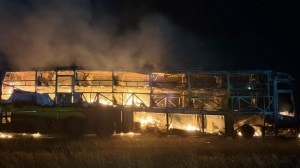Jiang Zemin blames India for nuclear imbroglio
NEW DELHI, June 3: On the eve of a crucial meeting of the foreign ministers of the five Security Council permanent members in Geneva, China ...

NEW DELHI, June 3: On the eve of a crucial meeting of the foreign ministers of the five Security Council permanent members in Geneva, China today sought to turn up the heat against India, saying it was the “target” of New Delhi’s nuclear tests.
But in the Capital, Prime Minister Atal Behari Vajpayee led the exercise in calming passions worldwide, pointing out to China that it only wanted a “mutually responsive” relationship, telling the Iranian foreign minister that India sought to abide by globally accepted norms on nuclear disarmament and reminding him that New Delhi had offered a “direct dialogue with Pakistan on all issues of mutual interest.”
In a written reply to a question asked in the Lok Sabha by Suresh Kurup of the CPM and Janardhan Prasad Mishra of the BJP, Vajpayee said India wanted a “friendly, cooperative and good neighbourly and mutually beneficial relationship with China on the basis of Panchsheel.”
In Beijing, however, Chinese President Jiang Zemin was stirred up enough to tellAFP that India was targeting China since it had aspired for a long period of time to be the main power of South Asia. He denied that China had supplied Pakistan with nuclear technology, saying all transfers were only for peaceful purposes. Significantly, the official Chinese press also picked up today the Western line about Kashmir becoming the root cause of a nuclear war in South Asia. The government-run `People’s Daily’, describing the Kashmir dispute as a “sleeping volcano beneath the nuclear threat,” went on to add that “India regards nuclear capability as the pre-requisite of becoming a world power and a necessary VIP ticket to the United Nations Security Council.”
Interestingly, Jiang also sought to play upon the differences between India’s political parties on the nuclear issue : he recalled the warm welcome he’d received at the hands of the United Front government in 1996, adding, “But the Prime Minister then was not the same as one today.”
Meanwhile in New Delhi, the Government pulled outthe stops for Iran’s Kamal Kharazzi, who had hopped over here from Islamabad for less than 24 hours.
A banquet was hosted for him last night and Vajpayee met him this afternoon. Even the television cameras were allowed to get close. New Delhi savoured the opportunity to bond with a nation that has lived with United States sanctions against it for 19 years — in the bargain, discussions were held to “intensify cooperation in the hydrocarbon sector.”
Vajpayee took pains to point out to Kharazzi that India was ready to abide by its moratorium on testing, participate in discussions on a fissile material treaty globally as well as a “no first use” agreement with Pakistan.
The conversation with Kharazzi, said to be a key Iranian figure in seeking a thaw in relations with the West, often seemed directed at the self-same Western nations: The elimination of nuclear weapons “cannot be placed in an exhaustive South Asian context,” insisted Vajpayee, they had to be discussed in a global framework.
Kharazzi, who has gone to Geneva from New Delhi, is now believed to have asked for meetings with the Indian and Pakistani ambassadors in that city. Savitri Kunadi, the Indian representative told The Indian Express that she’d accepted a courtesy call with Kharazzi, but had made clear to the Iranians the Indian line: Kashmir was a bilateral dispute that could only be settled between the two countries, there was no place in the talks for a third party.
Chinese intruded twice in ’97: Fernandes
Denying construction of a helipad by the Chinese in Arunachal Pradesh recently, the minister said during question hour that the intrusion by the Chinese army personnel was taken up at established fora like the border personnel meeting and the expert group meeting.
"All bearing on India’s security environment is regularly monitored and reviewed,"he said. On the threat assessment made with regard to all relevant factors, he said there was no violation of the border by the Chinese army in 1998.
Referring to unprovoked firing on the Indo-Pak border in Jammu and Kashmir, he said 859 incidents of firing on the line of control and 168 on international borders were reported from November 1997 to April 1998.
"Appropriate response" is being given by Indian troops to firing by Pakistani soldiers, taking due care that incidents remained localised and the casualties are minimal, he added. There have been no incidents of firing on the international border in Rajasthan, Gujarat and Punjab, the minister added.





- 01
- 02
- 03
- 04
- 05


























